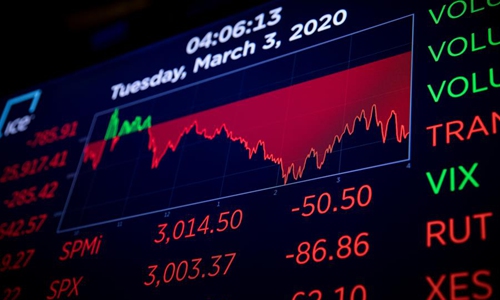Mainland companies may lose interest in IPOs, but room for talks under Biden
By Xie Jun and Yang Kunyi Source: Global Times Published: 2020/11/29 21:28:40

US stock market. Photo: xinhua
There's massive room for maneuvering in how the US will treat Chinese mainland-based companies listed there under a new bill, which the US House of Representatives will vote on soon, experts said. If passed, many Chinese companies will be reluctant to seek listings or remain listed on US stock markets, but analysts also anticipate room for negotiations, as the Biden administration would likely ease the crackdown on Chinese companies.
The US House will consider a measure on Wednesday that would force Chinese companies listed on US stock markets, like Alibaba Group Holding, either to make the transition to getting an annual audit that is reviewed by US regulators, or remove the shares from trading in the US, according to wsj.com.
Approved by the US Senate in May, the measure also requires Chinese companies listed in the US to ensure they are not owned or controlled by any government.
Those companies will have three years to comply with the inspection requirements before they could be kicked off US stock markets, the wsj.com report said.
The measure would make the future uncertain for the bulk of Chinese companies that are listed in the US, which cover a variety of industries but are mostly in information technology, consumption and finance.
Dong Shaopeng, a senior research fellow at the Chongyang Institute for Financial Studies of Renmin University of China, told the Global Times that the biggest concern of Chinese companies listed in the US would be the potential arbitrary nature of the bill, especially given the requirement to certify that the companies are not under government control.
"It is inevitable that some of the biggest Chinese companies have business ties with Chinese government entities," Dong Shaopeng said. "While they don't necessarily have a government background, there is massive room for maneuvering when the US determines whether that counts as government control."
Some analysts predicted that the bill will affect listed mainland-based companies that have state ownership to a greater extent.
The China Securities Regulatory Commission earlier replied that China had never prevented accounting firms from providing audit working papers to overseas regulatory institutions, but Dong Shaopeng said that in practice, China would expect the procedure to be done through government agencies instead of commercial third parties.
While it's still unclear how mainland companies listed in the US will respond if the measure becomes law, analysts said that it would deprive US investors of opportunities to share the dividends of mainland companies.
As of the end of September, about 260 mainland companies were listed in the US with a total market capitalization of more than $2.22 trillion, or 4.6 percent of the overall US market capitalization, data from financial analyzing company Wind showed.
Dong Dengxin, director of the Finance and Securities Institute at Wuhan University of Science and Technology, said that the legislation would hit US stock markets' diversification by scaring away mainland companies that are eyeing a free, accommodative market.
"The measure will significantly dampen Chinese companies' enthusiasm to go public in the US. Besides, some Chinese companies have been performing very well in the US, and delisting them would deprive investors of good opportunities," Dong Dengxin told the Global Times on Sunday.
Investors might lose many attractive targets that could bring them profits at a time of economic uncertainty. In 2019, 14 mainland stocks listed in the US saw their share prices double. The share price of Alibaba has surged by about 27 percent so far this year.
On the other hand, tightening audits by US regulators will provide "an influx of opportunities" for the Hong Kong and Shanghai stock exchanges if many mainland companies are forced to stop trading in the US, analysts said.
According to Dong Dengxin, China has sought to provide alternatives in its own markets through reforms, and both the markets in Shanghai and Hong Kong are now reaching competitive level of inclusiveness to companies with different business models and levels of profitability.
About 120 mainland companies had delisted from the US by the end of the first quarter this year, data from the Zero2IPO Research showed.
But experts said that there might be room for negotiation after Joe Biden assumes office as the new US president.
"The bill reflects the policy of the Trump administration and the Republicans. I figure that the Biden administration will be more flexible and restrained in cracking down on Chinese companies," Dong Dengxin said.
Dong Shaopeng said that the US stock market is still where global capital congregates, and it will be a shame for both investors and companies if Chinese stocks are forced to delist.
Chen Da, executive director of Anlan Capital, an asset management company, told the Global Times that under the Biden administration, the bill might aim for the long-term healthy development of the market instead of targeting China. He said that the bill should also be a response to recent high-profile accounting scandals, including that of Chinese coffee shop chain Luckin.
Newspaper headline: Vote looms on Chinese firms' US listings
Posted in: MARKETS